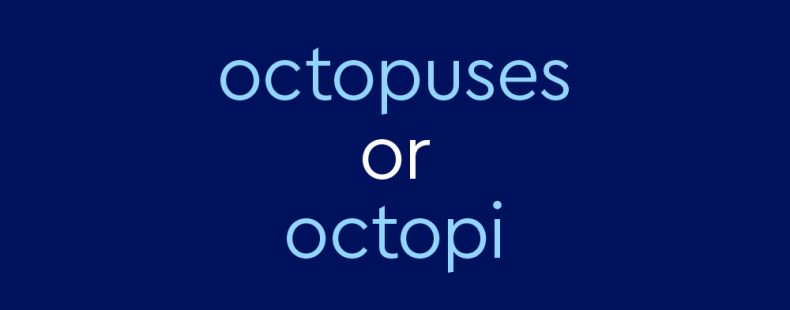It’s the internet’s favorite eight-armed plural debate: octopuses vs. octopi. (And that relative newcomer, octopodes.)
Is there a “correct” plural for octopus? And what’s with the -i in octopi?
In this article, we’ll wrap our tentacles around these questions, break down the differences between each term, and tell you which terms are acceptable and most commonly used.
⚡ Quick summary
Both octopuses and octopi are acceptable plurals for octopus. Of the two, octopuses is the simpler and more commonly used. The proposed plural octopodes is based on the plural of the Ancient Greek word from which octopus ultimately derives. But it’s rarely used outside of the octopuses vs. octopi debate.
Is it octopuses or octopi?
Like the octopus itself, the English language is, in many cases, very flexible: both octopuses and octopi are acceptable and commonly used plural forms of octopus (despite what anyone on the internet may say).
But why octopi? Well, in Latin, there’s a class of words that end in -us. These words get pluralized by replacing -us with -i. Many English words with strong roots in Latin have retained this pluralization pattern—think alumnus/alumni and stimulus/stimuli.
Along with octopus, there are a few cases in which both endings are used, including: platypuses/platypi; cactuses/cacti; syllabuses/syllabi; and thesauruses/thesauri (though, if you ask us, a plural is unnecessary here since you really only need one thesaurus).
Still, in all these cases, it’s more common to pluralize with a plain old -es.
If you’re looking for a tie-breaker, consider this: scientists who study these creatures seem to prefer the plural octopuses (though of course the preference is not universal).
What about octopodes?
Some people object to the plural -i ending in octopi because octopus actually derives from the Latinized form of the Greek word oktṓpous (meaning “eight-foot”). The plural of this word would be oktṓpodes.
Based on this, some have proposed the plural octopodes. Reverse-engineering a word’s plural to match its language of origin is a strange way to go about using language (especially when there are two perfectly good plurals right there), so octopodes is not commonly used. Still, some people like to use it (especially to spice up the octopuses vs. octopi debate).
P.S. Don’t confuse octopodes with the word octopods, which refers to the eight-armed cephalopod mollusks of the order or suborder Octopoda, including octopuses and paper nautiluses.
P.P.S. (Platypus Postscript) Platypus has an origin similar to octopus (from the Greek platýpous, meaning “flat-footed”), so the equivalent hypothetical plural would be platypodes. But we don’t see platypodes happening anytime soon.
Do you know the difference between an alligator and a crocodile?
Examples of octopuses and octopi used in a sentence
You have encountered more than one octopus and you want to know how to describe your situation. Check out these example sentences, in which we show how octopuses and octopi are always interchangeable.
- Octopuses/octopi are often solitary.
- We saw not one but two octopuses/octopi during our dive today!
- Different types of octopuses/octopi can vary greatly in size.














